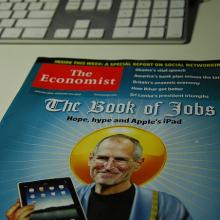Faith
I’m often asked about what trends I see within Christianity, both good and bad. So in my ongoing effort to help name trends and offer an alternative way of thinking about our faith, here are the five biggest things I’ve seen that tend to keep us from doing our best work as the living, breathing body of Christ in the world today.
1. Church Buildings — Many of our church buildings were established in a time when Christianity was booming numerically in the United States. We could hardly keep up with the growth happening all around us. Understandably, churches popped up where the people were too, drawing many away from their old downtown churches to a more convenient suburban community. But as our numbers have dwindled – combined with the fact the we’re a much more mobile society now that ever before – many churches are becoming monuments to what has long since passed. They have become an albatross rather than an asset.
The bearer of Good News, the one who carries the message of Resurrection, is not motivated by fear of punishment (either for herself or others) but by confidence in her experience of the love of God. She knows God's love is greater than anything in herself or in her hearers; that Jesus can conquer anything in them that is not controlled by holy love.
"Such love has no fear, because perfect love expels all fear. If we are afraid, it is for fear of punishment, and this shows that we have not fully experienced his perfect love." 1 John 4:18
God's love has the final word, for Jesus has conquered the sin of the whole world and has defeated the grave. Christ's best messengers know this love by its all-consuming redemptive activity in themselves and confidently carry this love to others, without fear.
Have we missed those moments where God is hitting us over the head by using people to continue the work of God in the world? Has the church been so focused on bodies, babies, and baptisms that we have failed to see the goodness of God outside the four walls of the church?
I talk to people nearly every day about the presence of God in the world. I speak of how God knows us, cares for us and is abiding with humanity in every time and place. But as with most things, they are easier said than done. Sometimes it takes something drastic to get our attention instead of trying to navigate this thing called life alone.
For one to actually contemplate the presence of God in the world is a bit overwhelming; For one to actually contemplate the presence of God in the world is a bit overwhelming; God is present in every aspect of human life — from the trees, to the clouds, to the faces of people we interact with each day. They are all created by the same hands of the same God.
Turning our faith into a set of rights and wrongs is partially based upon our own insecurities, but our fears are often warranted by how others respond to us.
“You attend that church?! Oh, that’s your pastor?! You went to that seminary?! You’re reading that book?! You like that theologian?! You belief that?! You like that type of worship?!”
It’s happened to us all at least once — someone labels our faith as wrong.
Question after question, one after another, on a daily — almost hourly — basis. If we aren’t careful, our faith and spirituality can quickly devolve into a set of distinct questions and responses.
In a corporate culture driven by hard data, statistics, evidence, trends, sales, surveys, and measurable information, our beliefs can be treated like a quarterly business summary — dissected, analyzed, and studied.
Our relationship with God turns into a cold and calculated set of methodologies, hypotheses, and professional-driven structures — the intimacy, raw communication, and love slowly disappears.
The mystery of God becomes something meant to be overcome, explained and defeated. And our church institutions become modeled after Fortune 500 companies instead of reflecting the vibrant early church communities of the New Testament.
Too much religion can harm a society’s economy by undermining the drive for financial success, according to a new study in the journal Social Psychological and Personality Science.
The study of almost 190,000 people from 11 religiously diverse cultures is raising eyebrows among some of England’s religious leaders for suggesting Judaism and Christianity have anti-wealth norms.
Recently I’ve been re-reading Susan Cain’s excellent book, Quiet: the Power of Introverts in a World that Can’t Stop Talking. Extroverts will want to take it with a grain of salt (although some of the book’s speculations suggest that extroverts are fairly thick-skinned about being taken down off their pedestals), but the book is a fascinating exploration of what it’s like to be an introvert in the world, including some analysis about how one gets to be an introvert, anyway, including how much is genetic, and how much comes from early environment.
It was in reading one of these “nature or nurture?” passages that I first encountered the “orchid hypothesis.” Taking its name from David Dobbs’ 2009 article, “The Science of Success,” published in The Atlantic, the orchid hypothesis essentially argues, as Cain puts it, that:
“… many children are like dandelions, able to thrive in just about any environment. But others, including the high-reactive types that [developmental psychologist Jerome Kagan] studied, are more like orchids: they wilt easily, but under the right conditions can grow strong and magnificent.” (Quiet, 111)
This jumped off the page at me.
One Sunday morning, I was facilitating a discussion with the teenagers in my small group. The students were engaged. Most of them voiced their opinions. Some of them even backed their views up with Scripture. Others defended their stance based on personal experience. The discussion was going well, but we had veered so far off course that I wasn't sure how to make our way back to the original topic. Usually this didn't bother me, because those seemed to be the times their perspectives were broadened the most. But I could see things were beginning to get heated. The students were divided and beginning to make things personal.
I interrupted the students in hopes of bringing them back to the point at hand. It didn't help. The open dialogue on truth had taken a turn for the worse. It was now a full on assault in which denominational pride resorted to church bashing and religion hating. I knew that if I didn't intervene soon, all hell would break loose — the Crusades would be re-birthed and someone might get burned at the stake. After a while, my frustration got the best of me and I opened my mouth long enough to let a few unfiltered words fly. No, I didn't yell, swear at them, or lose my temper in any manner. Had that been the case, I'm sure the backlash would have been much quicker and less severe.
There, in the middle of what used to be the sanctuary, I told that small group of teenagers they could find truth in the Qur'an.
So, here's the thing. I just met Rev. Alfred Williams. He's a retired UCC pastor. At 81, he's still preaching and teaching. He's still asking great questions and pushing congregations to do the same. When I am his age, I hope to be as passionate. Hell, I wish I were as passionate now. With that introduction, I want to share this sermon that he preached on Aug.18 of at Ladera Community Church.
I think this sermon serves to blow apart some of our assumptions about generational differences within church leadership. He preached on Mark 8:27-33.
My children spend more time building with Lego than just about anything else. Almost always, what they make is surprising, unexpected, startlingly new.
I want to share some observations from when a totally different thing enters the picture: the Lego building challenges.
For days after they read about a new “challenge” (build a dream home, build some kind of robot, etc.) they’ll work and re-work a project and pester us to photograph them and worry about whether or not they’ll win. Here’s the surprising part:
When they are building for the contest — for that $100 gift card and their picture in the magazine — their creations are startlingly less creative. All of a sudden, they are timid and anxious about their creations. Honestly, their for-contest work is always inferior to their regular work.
Why does this matter? Because I think it shows us something important about motivation and its effect on creativity.
As a teacher, I tend to change the channel or radio station when the news turns to issues related to schooling and education. It is difficult to listen to people discuss aspects of my daily experience as if they were a part of it. When a news story involves an act of violence in a school or a natural disaster wreaking devastation on children and school employees, I am almost less likely to listen. It is too painful to think about what that would be like for me, my colleagues, and most importantly, my students.
When major news networks began playing a recording of suburban Atlanta school employee Antoinette Tuff’s 911 call reporting a shooter in her school’s building on Tuesday, I almost turned off the TV. Then, I heard Tuff’s calm voice interacting with the shooter as though as he was any distraught child in the office needing extra attention. I started to listen.
Out of nowhere, I felt an urge to listen to Willie Nelson’s epic album Stardust, a collection of pop standards that went platinum when it was released in 1978.
As I listened to “Blue Skies” and “On the Sunny Side of the Street,” I remembered buying this album for my father. I thought he would enjoy a fresh take on these songs of his youth, his travails during the Great Depression, and the war that defined his generation.
I don’t think he ever listened to it a second time. He loved the songs, but he couldn’t bear the fresh take. He wanted Gertrude Lawrence, the original voices of Tin Pan Alley and Depression-era hopefulness, the crooners that carried his generation to war and back home again.
I understand. The music we hear at our first dreaming, first love, first dance becomes the soundtrack of our lives.
For many people, the same is true of faith. Our images of God, songs of worship and language of prayer tend to be those we acquired at first awareness. Many more images, songs and words will come later, but none might resonate so deeply as those that were imprinted on us early on.
The new movie about Steve Jobs is short on anything explicitly religious. Like its main character, however, it’s got a thread of transcendence running through it.
The truth about Jobs and religion may be that, in this arena as in others, he was ahead of the cutting edge.
The film isn’t making the purists happy, in part because it takes too many liberties with history. But it’s not a documentary. I’ll go against many of the reviews and say that Ashton Kutcher does a pretty good job at representing the personality found in Jobs’ speeches and in what has been written about Jobs — particularly in the massive authorized biography by Walter Isaacson.
One quote in that book, from one of Jobs’ old girlfriends, pretty much captures the character in the film: “He was an enlightened being who was cruel,” she told Isaacson. “That’s a strange combination.”
We know neither her name nor the location from which she comes. All we know is that she was “a woman with a spirit that had crippled her for eighteen years,” and that, “[s]he was bent over and was quite unable to stand up straight.” (Lk. 13:11) We don’t know from the text exactly what causes this spirit to lash out at this woman. We do know, though, the power of this spirit is to slowly and deliberately destroy this woman’s life. Whether this spirit manifesting its wicked power in this way is a result of the woman’s sinfulness or was it simply the way she was born we do not know. So weighted down by its power is she that she can’t “stand up straight.”
All we know is that bent over, exhausted, worn, and arid from the despair that comes from the power of this spirit, pushed to the margins of society, and dead inside, this woman comes in from the heat of the day to seek shelter in the synagogue.
They are nameless when they arrive at Magdalene. Seeking shelter – relief – from the power of the spirit whose work it had been to destroy them through drugs and prostitution, they come completely exhausted and desperate. Like the woman in the text, these women of Magdalene live on the edge between death and life. Living in the shadows, under the oppressive weight of the spirit whose power it had been to press the life right out of them, these women, like the woman in this text from Luke, “can’t stand up straight.”
I just got back a few days ago from a campsite outside of Asheville, N.C., the site of the third annual Wild Goose Festival. For those who are unfamiliar with the event, imagine and old-fashioned days-long outdoor revival, combined with Bonaroo and a traveling circus. For several days, authors, activists, artisans, musicians, and seekers converge to engage in spontaneous community, share ideas and to inspire one another.
It's not every day that you can walk by a makeshift tent and listen to Phyllis Tickle succinctly summarize the history of Christendom in 45 minutes, and then wander over and pick up a vegetarian pita sandwich while on your way to hear the Indigo Girls perform. Impassioned conversations emerge all on your walk about everything from child trafficking to the state of the institutional church in the 21st century. And you're only momentarily distracted by the guy on stilts, wearing a hat covered in goose feathers who wanders by for no apparent reason.
Welcome to Wild Goose.
Biblical writers suggest that God loves a holy mess. They compare God’s creative spirit to a strong wind, and we all know what happens when a powerful wind blows through our windows or through our lives — everything gets upended! One image in Genesis has God scooping up a bit of earth to create us. Yes, God had to get some dirt under the fingernails in order to bring us about.
Jesus was creative in how he touched and healed people, often making himself ritually unclean in the process. He embraced his uncleanliness.
Sadly, many religious institutions discourage us from doing the same.
The “secular world” has liars and thieves, adulterers, cheaters, and hypocrites. It’s a place full of child molesters, domestic abusers, and addicts. Where loneliness is rampant, mental illness is on the rise, and individuals routinely try to numb their pain via drugs, alcohol, and sex. Divorce is everywhere, pornography infects the minds of millions, and infidelity occurs on a regular basis.
The church often presents itself as an alternative to the “real world,” a place where these things don’t exist.
Many churches refuse to admit that these problems are affecting them. In reality, there is little statistical difference between Christians and non-Christians relating to these issues. Christians don’t receive a special pass that protects them from experiencing mental illness, suffering, struggling with addiction, abusing other people, being abused, or failing.
Our faith in Christ gives us hope and strength and courage, but it doesn’t erase reality, and it isn’t meant to create a flawless utopia where we can escape from the world’s problems. But many churches attempt to do just that — trying to create the perception of perfection.
In some church communities, there is the appearance that porn, sexual abuse, and rampant sin don’t exist. Even non-sinful things (mental illness, poverty, etc.) are treated as stigmas that are intentionally shunned. This is often misinterpreted as holiness — it’s not.
WASHINGTON — What’s one way to ensure that a new Hebrew-immersion public charter school isn’t a Jewish school? Hire a priest to run it.
Sela, which means “rock” or “foundation” in Hebrew, opens in Washington, D.C., on Aug. 19. As a public school, Sela may not teach or show preference to any religion. But the intimate connection between Hebrew and Judaism makes some people wonder whether the separation is truly possible.
The question is not just for Sela, but for the dozen or so other public Hebrew charter schools from Brooklyn, N.Y., to San Diego that have started since the first one opened in Florida in 2007. And more Hebrew language charters are in the design stage.
Making things even more complicated is Hebrew’s ties not only to Judaism but to Israel. When the Sela staff began naming classrooms for major cities in Israel this summer, the school’s executive director, Jason Lody, said there would be no class named after the disputed capital of Jerusalem.
“We want to be a public school of excellence,” Lody said. “We don’t want to be sidetracked by political conversations that don’t focus on getting our 4-year-olds ready for kindergarten.”
In the September-October 2013 issue of Sojourners magazine, senior associate editor Julie Polter interviewed award-winning comic book author and artist Gene Luen Yang about his new two-volume graphic novel, Boxers & Saints.
The truth is that our faith and spirituality is often dependent on hundreds of different relationships, factors, institutions, and circumstances that we directly correlate with God.
When our Christian expectations are shattered, it’s easy to blame God. We mistakenly idolize the things that are associated with God, and assume that if one of these aspects failed then God failed.
“Christianity” will fail us. Our churches will attack, our pastors will lie, our mentors will manipulate, our friends will betray, and when this happens, our beliefs will be shaken to their core.
I live in Texas. To many of its millions of residents, it is the greatest state in the union. We like things big and we like them to be bigger than every other state blessed to be in the Union. Texans are proud of their state; chalk it up to early indoctrination of Texas history throughout the life cycle of Texas Public Education.
But being in Texas, especially East Texas, means that we are sitting squarely and firmly in the buckle of the Bible Belt. The Bible Belt is a term used to describe the area where conservative Christianity is the prominent player in the state’s religiosity; generally this term refers to a high level of conservative, evangelical Christians. This does not mean that you can’t find conservative, evangelical Christians outside of this arbitrary boundary, but for some reason they seem to cluster in these areas in high concentrations.
I didn’t grow up in a church that beat people over the head in church or judged people for they way they acted. I felt loved and welcomed in a place where people were friendly and they loved serving God. I learned about Christ and God’s love for humanity. It wasn’t until I was older that I began to hear more Christians speak more and more on the necessity of evangelizing to people or even being “saved correctly.” I can remember on several occasions a certain church in the town I grew up in going door to door and asking people if they were to die tonight would they go to Heaven. I can remember thinking that it was an odd tactic to get people to come to church. It seemed so stand offish and so self-righteous that it left a bad taste in my mouth.


















